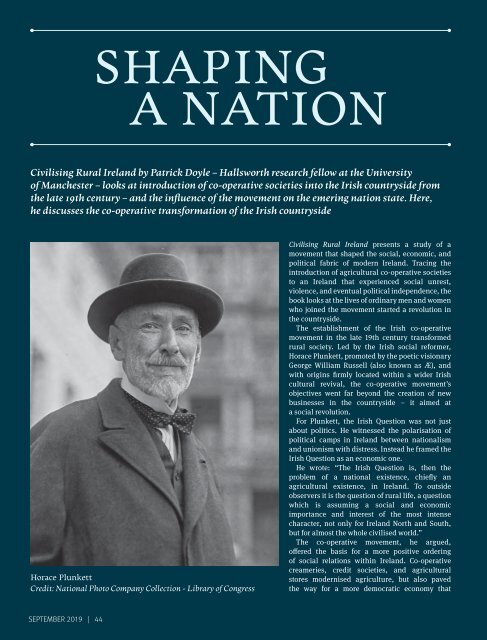Co-op News September 2019: Agriculture
How are co-ops working agriculture?
How are co-ops working agriculture?
You also want an ePaper? Increase the reach of your titles
YUMPU automatically turns print PDFs into web optimized ePapers that Google loves.
SHAPING<br />
A NATION<br />
Civilising Rural Ireland by Patrick Doyle – Hallsworth research fellow at the University<br />
of Manchester – looks at introduction of co-<strong>op</strong>erative societies into the Irish countryside from<br />
the late 19th century – and the influence of the movement on the emering nation state. Here,<br />
he discusses the co-<strong>op</strong>erative transformation of the Irish countryside<br />
Horace Plunkett<br />
Credit: National Photo <strong>Co</strong>mpany <strong>Co</strong>llection - Library of <strong>Co</strong>ngress<br />
Civilising Rural Ireland presents a study of a<br />
movement that shaped the social, economic, and<br />
political fabric of modern Ireland. Tracing the<br />
introduction of agricultural co-<strong>op</strong>erative societies<br />
to an Ireland that experienced social unrest,<br />
violence, and eventual political independence, the<br />
book looks at the lives of ordinary men and women<br />
who joined the movement started a revolution in<br />
the countryside.<br />
The establishment of the Irish co-<strong>op</strong>erative<br />
movement in the late 19th century transformed<br />
rural society. Led by the Irish social reformer,<br />
Horace Plunkett, promoted by the poetic visionary<br />
George William Russell (also known as Æ), and<br />
with origins firmly located within a wider Irish<br />
cultural revival, the co-<strong>op</strong>erative movement’s<br />
objectives went far beyond the creation of new<br />
businesses in the countryside – it aimed at<br />
a social revolution.<br />
For Plunkett, the Irish Question was not just<br />
about politics. He witnessed the polarisation of<br />
political camps in Ireland between nationalism<br />
and unionism with distress. Instead he framed the<br />
Irish Question as an economic one.<br />
He wrote: “The Irish Question is, then the<br />
problem of a national existence, chiefly an<br />
agricultural existence, in Ireland. To outside<br />
observers it is the question of rural life, a question<br />
which is assuming a social and economic<br />
importance and interest of the most intense<br />
character, not only for Ireland North and South,<br />
but for almost the whole civilised world.”<br />
The co-<strong>op</strong>erative movement, he argued,<br />
offered the basis for a more positive ordering<br />
of social relations within Ireland. <strong>Co</strong>-<strong>op</strong>erative<br />
creameries, credit societies, and agricultural<br />
stores modernised agriculture, but also paved<br />
the way for a more democratic economy that<br />
SEPTEMBER <strong>2019</strong> | 44


















